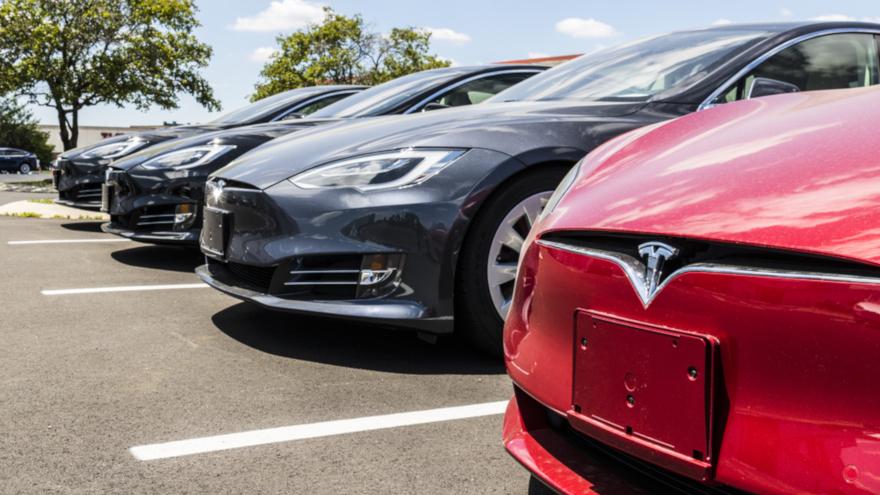Used EV market ‘relatively non-existent’ so far, but change could be near

Photo credit: Jonathan Weiss / Shutterstock.com
By subscribing, you agree to receive communications from Auto Remarketing and our partners in accordance with our Privacy Policy. We may share your information with select partners and sponsors who may contact you about their products and services. You may unsubscribe at any time.
CARY, N.C. –
A Cox Automotive conference call discussing the latest phase of its study titled, “Evolution of Mobility: The Path to Electric Vehicle Adoption,” highlighted results from a Cox Automotive survey of consumers and dealers. One of those findings: Consumers believe EVs are coming, but that hasn’t increased their interest in buying one. The session discussed additional trends such as the finding that Tesla leads the pack in EV brand awareness.
But the discussion also turned toward used EVs, as Cox Automotive manager of economic and industry insights Zo Rahim said that as the market intensifies its look at the rise of electric vehicles, his company is also focusing on used electric vehicles.
Rahim said increasing used EV sales means increasing used EV supply.
“So far, the used EV market has been relatively non-existent, but it’s [ripe] for change,” Rahim said. “To examine EVs in the remarketing space, we’re studying both supply and pricing trends to learn about how these vehicles behave in the wholesale and used markets.” He added that his company’s Manheim Used Vehicle Value Index could soon share information such as EV price dynamics in the wholesale market.
Dealers: EVs represent 9% of average CPO vehicles sold per month
One section of the presentation showed that dealers say EVs represent only 9% of total average CPO vehicles sold per month and 4% of total average used non-CPO vehicles sold per month. However, EVs, according to the study, also only represent 5% of total average new vehicles sold per month.
Asked by Auto Remarketing to comment on those numbers, Rahim stated that, “Since a majority of new-vehicle sales are done via a franchised dealer (with the exception of Tesla), a dealer is involved in both retail and fleet sales. Businesses purchasing EVs for commercial fleets could [affect] a dealer’s perception of how many EVs they sell, since not all of them will be consumer retail sales."
Subscribe to Auto Remarketing to stay informed and stay ahead.
By subscribing, you agree to receive communications from Auto Remarketing and our partners in accordance with our Privacy Policy. We may share your information with select partners and sponsors who may contact you about their products and services. You may unsubscribe at any time.
He added that his company currently sees that 4% of total new EV sales have been fleet.
“So not exactly a large number, but a possible reason why dealers might think they are doing slightly more sales,” he said.
In response to a question on whether a larger amount of used EVs on the market alleviates buyer fears on the cost of new EVs, Rahim answered, “I think we’re getting there, I don’t think we’re there just yet.”
He said that although consumer perception has shifted given the greater supply of EVs “it’s still a very relatively small portion of the used-vehicle market.” He elaborated that it’s actually lower than 1% of that market.
Once more of the vehicles enter the wholesale space and dealer showrooms on the used side, Rahim said he feels that will help consumer perception of the durability and cost-effectiveness of EVs, but he repeated, “I don’t think we’re there just yet.”
The study, which surveyed a mix of EV owners, considerers, and non-considerers, along with single or group franchise dealers, showed additional trends, however. After Tesla, Toyota was second in EV brand awareness, with Chevrolet, Nissan, and Honda following.
Cox Automotive Mobility Group manager of research and market intelligence Rachelle Petusky discussed the study results during the main portion of the presentation, saying that Tesla has done well in presenting itself as “the innovative leader in EVs.”
That is translating to high awareness of Tesla among consumers,” Petusky said. Toyota, she added, “has definitely had a halo effect, with the Prius being considered an EV brand among consumers.” Without Tesla, she said, EV market share has remained relatively stagnant.
Cost and other barriers to adoption
The study covered barriers to adoption among non-considerers, with 70% listing cost as a barrier and 83% listing charging/battery as a barrier.
Perceived initial cost of EVs is higher than for internal combustion engine vehicles, according to the study. Responding to a question on whether they think that the price for an all-electric vehicle on average is about the same, less, or more than the price for a gas-powered vehicle, 77% of considerers and 87% of non-considerers answered yes.
According to the study, affordability is in reach "as the price gap closes." The study showed average transaction prices of the Nissan Leaf compared to the Nissan Maxima and Sentra from 2012 versus 2019. The average transaction price of the Nissan Leaf has declined by 2.5% from 2012 to 2019, while the Sentra has increased 3.1% and the Maxima has risen by 7.5%.
Other study findings:
— The average five-year total cost to own savings for an electric vehicle versus an internal combustion vehicle is 58%.
— In response to a question on how long they perceive that a typical all-electric battery lasts before it must be replaced, owners said 7.2 years, while considerers said 6.9 years.
— Fifty-two percent of EV owners purchased an extended warranty for the battery.
— There is a clear need for more charging stations. In response to the question, “what is your perception of the number of electric vehicle charging stations around the area where you live and work,” 68% of considerers said two few charging stations existed in their area, and 63% said too few existed in their work area.


